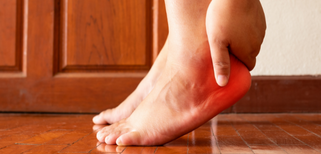




Health Information



Achilles Tendinitis Q&A

Achilles Tendinitis Q&A (by Simon Brouwer)
Achilles Tendinitis is a common pain in heel
Written by Simon Brouwer
1. How do I know I have Achilles Tendinitis?
Those suffering from Achilles tendinitis often complain of pain in the tendon or heel first thing in the morning when getting out of bed, after long periods of inactivity, or the start of exercising. A common complaint is stiffness. But this as well as the pain may reduce after the tendon has warmed up.
2. How is it treated?
Treatment for this condition is multifactorial and can include load management, strengthening the tissue, biomechanics correction, and manual therapy.
3. How long does it take to recover?
It is difficult to give an exact timeline as this depends on the severity of each case. However, it is not commonly a quick fix. Most patients will see improvement in 6-8 weeks. Others may take several months.
4. Can shoes cause Achilles tendinitis?
A change in footwear can indeed be associated with this condition due to a change in loading of the tissues.
5. Can I still exercise?
A common misconception is that the Achilles needs to be rested for it to heal. While load management is an important part of the rehabilitation process, tendons are meant to tolerate load and often need to be loaded to heal them.
6. Who are at most risk for Achilles Tendinitis? Is it runners?
- The disorder is most frequently seen in runners and running sports in the age range from 30 years old to 60 years old.
- Being overweight, chronic diseases that affect tendon quality (diabetes, rheumatoid arthritis or hypercholesterolaemia), the use of fluoroquinolones or statins, a reduced plantar flexor strength and reduced ankle dorsiflexion are generally considered to be risk factors for Achilles tendinopathy.
7. Should I use a hot or ice pack to relieve the pain?
Generally, ice is suggested to reduce pain and inflammation.
8. When do I need surgery?
A vast majority of cases can be treated conservatively; this is always our first course of action.
9. Any tips for preventing Achilles tendinitis?
Manage exercise loading with appropriate increases, increase calf strength, manage body weight, and maintain good ankle flexibility.



